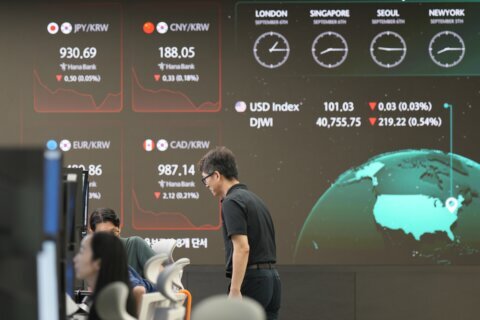COLOMBO, Sri Lanka (AP) — Sri Lanka will hold its presidential election on Sept. 21 in a crucial vote that will decide the future of the South Asian nation still struggling to recover from its economic collapse in 2022, which provoked mass protests and forced the former President Gotabaya Rajapaksa to flee the country and later resign.
The election is seen as a referendum on President Ranil Wickremesinghe’s two-year-long rule that has overseen a fragile recovery of the country’s economy.
He faces a tough challenge from the leader of the opposition in parliament, as well as from a left-leaning politician with a powerful alliance, who is gaining popularity among young voters.
Almost 17 million of Sri Lanka’s 22 million people are eligible to vote, and 38 candidates are running for office.
Who are the main candidates?
Wickremesinghe, whose United National Party has been weakened by a split, is running as an independent candidate. Even though Wickremesinghe remains unpopular for carrying out austerity measures — including sharp tax hikes — in exchange for an International Monetary Fund bailout, he is hoping to gain votes from his success in largely abating the shortage of essentials such as fuel, cooking gas, medicines and food.
But Wickremesinghe — a six-time prime minister — is at a disadvantage because he belongs to the old guard, whom Sri Lankans blame for the economic collapse.
Anura Kumara Dissanayake, the leader of a Marxist-led coalition named National People’s Power, is fast emerging as a key challenger to Wickremesinghe due to his popularity among the young people fed up with corruption that they believe caused the economic crisis. He is also drawing support from some voters who participated in the 2022 protests demanding the resignation of the then-President Rajapaksa.
Although he has been a leftist in the past, Dissanayake now professes economic freedom and promises welfare measures to help the working class. Political analysts say he is a strong contender because, unlike his rivals, he is not linked with the business and political elites who ran the country in the past.
Wickremesinghe’s other challenger is Sajith Premadasa, the incumbent president’s former deputy and leader of his breakaway party, United People’s Power. Premadasa promises to continue with the IMF program but with changes to lessen the burden on poor people.
He has also promised a degree of power devolution to the minority Tamil community, who make up about 11% of the country’s population. In return, Premadasa has secured the support of a strong Tamil political bloc.
What about the Rajapaksa family?
Namal Rajapaksa, the heir apparent to the once-powerful Rajapaksa clan, is also contesting. Namal’s candidacy will test whether his powerful clan — which has produced two presidents — can retain its hold on the country after many of its members were pushed into the political wilderness. His father, Mahinda Rajapaksa, is credited with crushing the Tamil armed separatist movement in 2009.
Namal is promising to ease the tax burden on Sri Lankans and build a strong economy, saying its meltdown in 2022 was largely due to the COVID-19 pandemic.
How does the election work?
Votes will be cast throughout the day on Sept. 21, with results expected to be out by evening the following day.
Voters can select three candidates from the ballot paper in the order of their preference. The first preferences will be counted first and the candidate who secures more than 50% of the valid votes will be declared winner.
If there is no clear winner, the first two candidates will be retained in the race and ballot papers that chose other candidates for No. 1 will be checked to see if either of the top two contenders are their second or third preference. Those votes will be added to the tally of the remaining two candidates. The candidate who gets the highest number will be declared the winner.
Sri Lanka has a powerful executive presidential system with the President being the head of state, government, cabinet and the armed forces. The prime minister has some powers like recommending Cabinet ministers.
There are no reliable opinion polls to suggest which candidate is in the lead, but many observers say Dissanayake has been gaining popularity.
Veeragathy Thanabalasingham, a senior journalist and political observer, said while it appeared to be a “two-horse race” between Premadasa and Dissanayake in early September, campaigning in the final weeks could place all three candidates on equal ground.
What are the big issues?
Sri Lanka’s economy is the key issue in the election.
Under Wickremesinghe, important economic figures have improved: Inflation dropped below 5% from 70% in 2022, interest rates were lowered, and foreign reserves grew. A 2% growth is predicted for 2024, the highest since the economic collapse, but financial benefits have not reached the common people, many of whom are affected by high living costs. Businesses and professionals are complaining of high taxes.
While Wickremesinghe says that the IMF agreement can’t be significantly changed, his rivals say they will try to renegotiate it to ease the burden on the public.
A large section of the population is also unhappy because it believes Wickremesinghe’s administration protected the Rajapaksa family, which has been accused of economic mismanagement and corruption. Many feel the family should be held accountable.
Copyright © 2024 The Associated Press. All rights reserved. This material may not be published, broadcast, written or redistributed.






